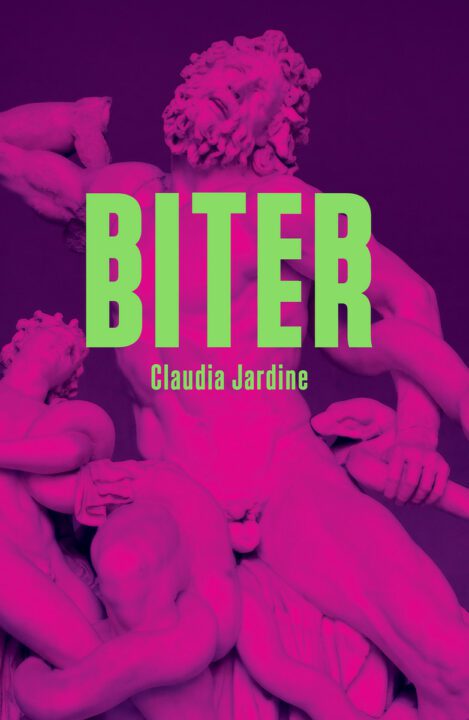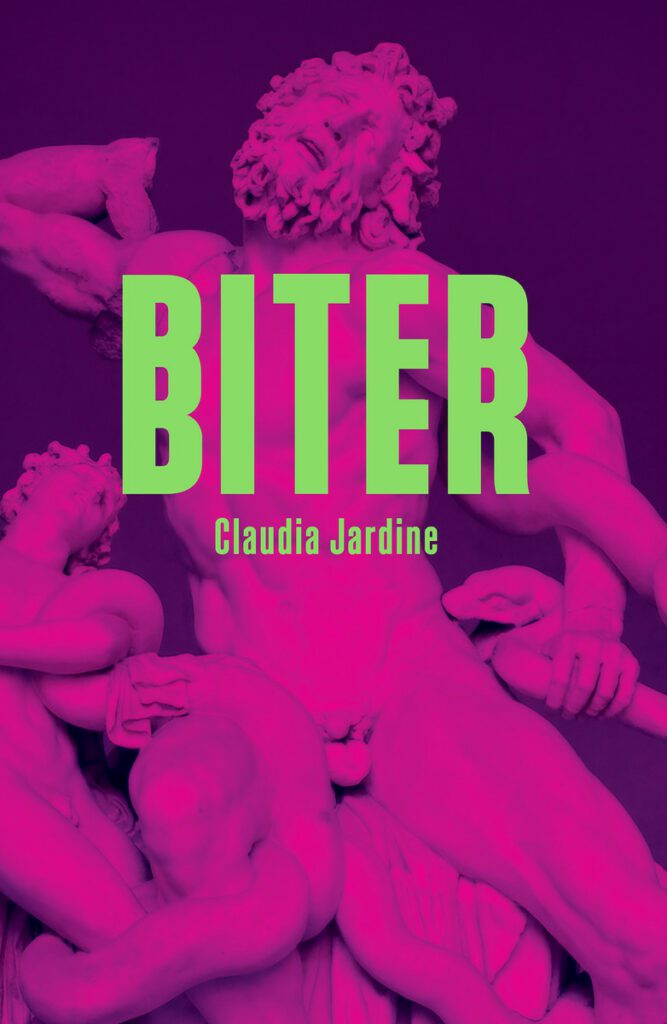BITER

BITER by Claudia Jardine. AUP (2023). RRP: $24.99. Pb, 76 pp. ISBN: 9781776711017. Reviewed by Andi C. Buchanan.
About halfway through her debut collection, Biter, Claudia Jardine opens a poem with:
My father has several university degrees
but none of them prepared him
for opening a block of cheese. (‘Thoughts Thought After Surveying the Contents of the Fridge, p. 27)
Up until then, as I read the collection, I’d been gathering thoughts about relatability, universality, and exclusivity. It started with finding out Biter includes epigrams from The Palatine Anthology, compiled in the tenth century from work, “attributed to authors who lived and wrote [in Greek] between the 7th century BCE and the 7th Century BCE”.
I didn’t go to the sort of school that taught ancient Greek, and then didn’t go for it when I had a chance at University. I’ve always felt my missing classical knowledge is a bit of a lack and I wondered if it might cause me to miss the point of this collection.
I can’t say my ignorance there didn’t matter here, as I don’t know what I might be missing, but it didn’t preclude my enjoyment of Jardine’s work. The erotic epigrams work for themselves, and yet there’s also a juvenile delight in knowing they have history—much like when you first discovered the graffiti at Pompei was full of poop jokes.
Biter isn’t juvenile. It’s matter-of-fact and irreverent; it writes about sex in the same way it does about other things. Things that for most people form a regular part of their life: changing bike tires, training dogs, and yes, surveying the contents of the fridge. It zeros in on the everyday, searching for detail and humour.
The author described Biter as a “book of contemporary poetry about love and relationships” and while the romantic kind of love and the sexual type of relationship are prominent, the wider network of relationships is also critical here—the ways people are interconnected, their connections spider webbing out, the moments in time and the touch of these connections, never quite leaving you.
It’s incorrect to assume that sexuality is universal; and asexual writers rightly object to cliches like “it’s what makes us human”. Many things can be common experiences without being universal, and the same goes for a father opening a packet of cheese; as not everyone has a father or a fridge, and some people are dairy intolerant. It’s true that I may over-relate here because my sibs and I have a story about parental reactions to an opened orange juice in the fridge, that we still tell almost thirty years later. All that said, it is still Thoughts Thought after Surveying the Contents of a Fridge (the cheese poem), modelled after Ogden Nash’s work, that for me epitomises Jardine’s talent for conjuring the relatable by honing in on the specific.
Also notable is the skillful use of the twist ending—not surprise for the sake of it, but rather the sense the poem was on that pathway all along, that it was inevitable and how could you not have seen it coming?
In many ways that’s the sort of contrast that sums up this collection. Jardine surprises us with the mundane, and finds exactly the right place for the surprising. She goes directly to the detail of what is or could be her own experience and finds something that is both unexpected, and easy to relate to, at the same time. The cheese may not be in its rightful place (“a reusable beeswax cheese bag”) but the everyday details and observations in these poems, despite their sometimes apparent randomness as a subject for poetry, absolutely are.
Andi C Buchanan lives and writes in Te Awa Kairangi ki Tai/Lower Hutt. Their recent novel Sanctuary is about found family and haunted houses. Andi’s short fiction has previously been published in Fireside, Cossmass Infinities, Lightspeed, and more. You can find Andi at https://andicbuchanan.org or on Twitter and Instagram at @andicbuchanan

